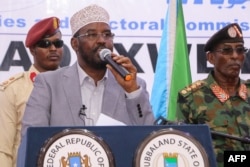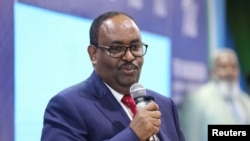WASHINGTON —
Political leaders in Somalia agreed Wednesday on a framework for the country’s first national one-person, one-vote elections, a government statement said.
The decision followed marathon monthlong talks led by Somali President Hassan Sheikh Mohamud that saw the withdrawal of Jubaland President Ahmed Mohamed Islam, also known as Madobe, from the National Consultative Council meeting in Mogadishu.
Somalia's government and federal member states said Wednesday that direct universal suffrage would be introduced with local elections set for June 2025.

The agreement signed by Prime Minister Hamza Abdi Barre, the leaders of three regional states and Mogadishu’s governor laid out a path to nationwide one-person, one-vote elections.
“The leaders agreed to introduce national elections, where citizens will vote for their leaders, starting with the local, regional and municipal elections set for June 2025,” read a communique released at the end of the meeting in Mogadishu.
“The election of parliamentary and presidential leaders of the Federal Member states will be held on September 2025,” the statement said.
The members of NCC also have ordered the completion of Somalia's National Independent Electoral Commission to facilitate the electoral process.
Opposition stand
In March, Somalia's parliament unanimously approved a bill overhauling the country's electoral system to reintroduce universal suffrage, a plan that has been criticized by some leading politicians.
The leaders of two federal member states, the Puntland President Said Abdullahi Deni and Jubaland President Islam, opposed Wednesday’s decision.

Unlike Islam, who stepped out of the NCC meetings two weeks ago, Deni repeatedly said that Puntland no longer would recognize federal institutions, accusing President Mohamud of violating the constitution and losing his legitimacy.
Additionally, prominent Somali opposition leaders, including former President Sharif Sheikh Ahmed, former Prime Minister Hassan Ali Khaire, and MP Abdirahman Abdishakur Warsame, have vehemently condemned Wednesday’s decision, calling it illegal.
“The decision illegally extends the terms of the regional presidents, threatens the national stability, the efforts of building good governance,” according to a statement from the opposition. “We will never accept it.”
The country has not had nationwide one-person, one-vote elections since 1969, when dictator Siad Barre seized power.
Mohamud was elected by lawmakers in May 2022 and previously said the next national elections would be by universal suffrage.
Currently, voting follows a complex, indirect model where state legislatures and clan delegates pick lawmakers for the national parliament, who in turn choose the president.
UN Security Council
Wednesday’s agreement comes on the heels of another significant development for Somalia.
The United Nations Security Council adopted a resolution on Wednesday facilitating the transition of the U.N. Assistance Mission in Somalia, or UNSOM, to the U.N. Country Team, or UNCT.
This shift, prompted by a formal request from the Somali government, presented by the United Kingdom, received unanimous support from all 15 member states of the council. It establishes that during this transition phase, the U.N.'s support activities in Somalia will be rebranded as the U.N. Transitional Mission in Somalia, or UNTMIS.
According to the resolution, the transfer of responsibilities from UNSOM to UNTMIS, alongside national authorities, will commence on November 1, and is anticipated to conclude by October 31, 2026.
U.K. Ambassador to the U.N. Barbara Woodward characterized the passage of the resolution as the "beginning of a crucial period for Somalia.”
"UNSOM has played an important role since its inception in 2013, supporting peace building and state building in Somalia through implementing its good offices, policy guidance, coordination, technical assistance and capacity building functions," she said.

 By Voice of America (Africa) | Created at 2024-10-30 22:41:45 | Updated at 2024-10-31 01:16:45
2 hours ago
By Voice of America (Africa) | Created at 2024-10-30 22:41:45 | Updated at 2024-10-31 01:16:45
2 hours ago



